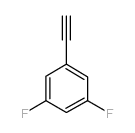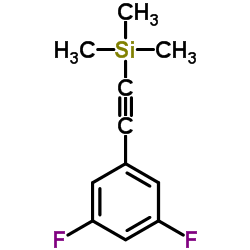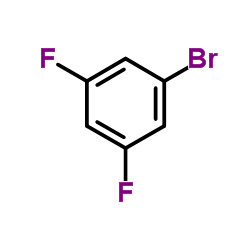151361-87-4
| 中文名 | 1-乙炔基-3,5-二氟苯 |
|---|---|
| 英文名 | 1-ethynyl-3,5-difluorobenzene |
| 中文别名 | 1-乙炔-3,5-二氟苯 |
| 英文别名 |
1-ethynyl-3,5-difluoro-benzene
3,5-Difluorophenylacetylene Benzene,1-ethynyl-3,5-difluoro 1-ETHYNYL-3,5-DIFLUOROBENZENE HCC(3,5-F2C6H3) 3,5-difluorophenylethyne MFCD04039982 |
| 密度 | 1.17g/cm3 |
|---|---|
| 沸点 | 147.1ºC at 760mmHg |
| 分子式 | C8H4F2 |
| 分子量 | 138.11400 |
| 闪点 | 32ºC |
| 精确质量 | 138.02800 |
| LogP | 1.94610 |
| 外观性状 | liquid |
| 折射率 | n20/D 1.4910(lit.) |
| 储存条件 | 密封储存,储存于阴凉、干燥的库房。 |
| 稳定性 | 常温常压下稳定,避免与强氧化剂接触。远离热源,火花,火焰。 |
| 计算化学 | 1.疏水参数计算参考值(XlogP):2.4 2.氢键供体数量:0 3.氢键受体数量:2 4.可旋转化学键数量:1 5.互变异构体数量:无 6.拓扑分子极性表面积0 7.重原子数量:10 8.表面电荷:0 9.复杂度:146 10.同位素原子数量:0 11.确定原子立构中心数量:0 12.不确定原子立构中心数量:0 13.确定化学键立构中心数量:0 14.不确定化学键立构中心数量:0 15.共价键单元数量:1 |
| 更多 | 1. 性状:浅黄色液体 2. 密度(g/mL,25℃):1.163 3. 相对蒸汽密度(g/mL,空气=1):未确定 4. 熔点(ºC):未确定 5. 沸点(ºC,常压):123-124 6. 沸点(ºC,1.5mmHg):未确定 7. 折射率(n20/D):1.4910 8. 闪点(ºC):33 9. 比旋光度(º):未确定 10. 自燃点或引燃温度(ºC):未确定 11. 蒸气压(mmHg,20ºC):未确定 12. 饱和蒸气压(kPa,25ºC):未确定 13. 燃烧热(KJ/mol):未确定 14. 临界温度(ºC):未确定 15. 临界压力(KPa):未确定 16. 油水(辛醇/水)分配系数的对数值:未确定 17. 爆炸上限(%,V/V):未确定 18. 爆炸下限(%,V/V):未确定 19. 溶解性:未确定 |
|
Section1. IDENTIFICATION OF THE SUBSTANCE/MIXTURE Product name: 1-Ethynyl-3,5-difluorobenzene Section2. HAZARDS IDENTIFICATION Classification of the substance or mixture According to Regulation (EC) No1272/2008 Flammable liquids (Category 3) Skin irritation (Category 2)
Eye irritation (Category 2) Specific target organ toxicity - single exposure (Category 3) According to European Directive 67/548/EEC as amended. Flammable. Irritating to eyes, respiratory system and skin. Label elements Pictogram Signal wordWarning Hazard statement(s) H226Flammable liquid and vapour. H315Causes skin irritation. H319Causes serious eye irritation. H335May cause respiratory irritation. Precautionary statement(s) P261Avoid breathing dust/fume/gas/mist/vapours/spray. P305 + P351 + P338IF IN EYES: Rinse cautiously with water for several minutes. Remove contact lenses, if present and easy to do. Continue rinsing. Hazard symbol(s) XiIrritant R-phrase(s) R10Flammable. R36/37/38Irritating to eyes, respiratory system and skin. S-phrase(s) S16Keep away from sources of ignition - No smoking. S26In case of contact with eyes, rinse immediately with plenty of water and seek medical advice. S36Wear suitable protective clothing. Other hazards - none Section3. COMPOSITION/INFORMATION ON INGREDIENTS Formula: C8H4F2 Molecular Weight: 138,11 g/mol CAS-No.EC-No.Index-No.ClassificationConcentration 1-Ethynyl-3,5-difluorobenzene 151361-87-4--Flam. Liq. 3; Skin Irrit. 2; Eye- Irrit. 2; STOT SE 3; H226, H315, H319, H335 Xi, R10 - R36/37/38 For the full text of the H-Statements mentioned in this Section, see Section 16. Section4. FIRST AID MEASURES General advice Consult a physician. Show this safety data sheet to the doctor in attendance. If inhaled If breathed in, move person into fresh air. If not breathing give artificial respiration Consult a physician. In case of skin contact Wash off with soap and plenty of water. Consult a physician. In case of eye contact Rinse thoroughly with plenty of water for at least 15 minutes and consult a physician. If swallowed Do NOT induce vomiting. Never give anything by mouth to an unconscious person. Rinse mouth with water. Consult a physician. Section5. FIRE-FIGHTING MEASURES Suitable extinguishing media For small (incipient) fires, use media such as "alcohol" foam, dry chemical, or carbon dioxide. For large fires, apply water from as far as possible. Use very large quantities (flooding) of water applied as a mist or spray; solid streams of water may be ineffective. Cool all affected containers with flooding quantities of water. Special protective equipment for fire-fighters Wear self contained breathing apparatus for fire fighting if necessary. Further information Use water spray to cool unopened containers. Section6. ACCIDENTAL RELEASE MEASURES Personal precautions Use personal protective equipment. Avoid breathing vapors, mist or gas. Ensure adequate ventilation. Remove all sources of ignition. Beware of vapours accumulating to form explosive concentrations. Vapours can accumulate in low areas. Environmental precautions Do not let product enter drains. Methods and materials for containment and cleaning up Contain spillage, and then collect with non-combustible absorbent material, (e.g. sand, earth, diatomaceous earth, vermiculite) and place in container for disposal according to local / national regulations (see section 13). Keep in suitable, closed containers for disposal. Section7. HANDLING AND STORAGE Precautions for safe handling Avoid contact with skin and eyes. Avoid inhalation of vapour or mist. Keep away from sources of ignition - No smoking. Take measures to prevent the build up of electrostatic charge. Conditions for safe storage Store in cool place. Keep container tightly closed in a dry and well-ventilated place. Containers which are opened must be carefully resealed and kept upright to prevent leakage. Section8. EXPOSURE CONTROLS/PERSONAL PROTECTION Personal protective equipment Respiratory protection Where risk assessment shows air-purifying respirators are appropriate use a full-face respirator with multi-purpose combination (US) or type ABEK (EN 14387) respirator cartridges as a backup to engineering controls. If the respirator is the sole means of protection, use a full-face supplied air respirator. Use respirators and components tested and approved under appropriate government standards such as NIOSH (US) or CEN (EU). Hand protection The selected protective gloves have to satisfy the specifications of EU Directive 89/686/EEC and the standard EN 374 derived from it. Handle with gloves. Eye protection Face shield and safety glasses Skin and body protection Choose body protection according to the amount and concentration of the dangerous substance at the work place. Hygiene measures Handle in accordance with good industrial hygiene and safety practice. Wash hands before breaks and at the end of workday. Section9. PHYSICAL AND CHEMICAL PROPERTIES Appearance Formliquid Colourlight yellow Safety data pH no data available Melting pointno data available Boiling point123 - 124 °C - lit. Flash point33 °C - closed cup Ignition temperature no data available Lower explosion limit no data available Upper explosion limit no data available Density1,163 g/cm3 at 25 °C Water solubilityno data available Section10. STABILITY AND REACTIVITY Chemical stability Stable under recommended storage conditions. Conditions to avoid Heat, flames and sparks. Materials to avoid Strong oxidizing agents Hazardous decomposition products Hazardous decomposition products formed under fire conditions. - Carbon oxides, Hydrogen fluoride Section11. TOXICOLOGICAL INFORMATION Acute toxicity no data available Skin corrosion/irritation no data available Serious eye damage/eye irritation no data available Respiratory or skin sensitization no data available Germ cell mutagenicity no data available Carcinogenicity IARC: No component of this product present at levels greater than or equal to 0.1% is identified as probable, possible or confirmed human carcinogen by IARC. Reproductive toxicity no data available Specific target organ toxicity - single exposure Inhalation - May cause respiratory irritation. Specific target organ toxicity - repeated exposure no data available Aspiration hazard no data available Potential health effects InhalationMay be harmful if inhaled. Causes respiratory tract irritation. IngestionMay be harmful if swallowed. SkinMay be harmful if absorbed through skin. Causes skin irritation. EyesCauses eye irritation. Signs and Symptoms of Exposure To the best of our knowledge, the chemical, physical, and toxicological properties have not been thoroughly investigated. Additional Information RTECS: no data available Section12. ECOLOGICAL INFORMATION Toxicity no data available Persistence and degradability no data available Bioaccumulative potential no data available Mobility in soil no data available PBT and vPvB assessment no data available Other adverse effects no data available Section13. DISPOSAL CONSIDERATIONS Product Burn in a chemical incinerator equipped with an afterburner and scrubber but exert extra care in igniting as this material is highly flammable. This combustible material may be burned in a chemical incinerator equipped with an afterburner and scrubber. Observe all federal, state, and local environmental regulations. Contact a licensed professional waste disposal service to dispose of this material. Contaminated packaging Dispose of as unused product. Section14. TRANSPORT INFORMATION ADR/RID UN-Number: 1993 Class: 3Packing group: III Proper shipping name: FLAMMABLE LIQUID, N.O.S. (1-Ethynyl-3,5-difluorobenzene) IMDG UN-Number: 1993 Class: 3Packing group: IIIEMS-No: F-E, S-E Proper shipping name: FLAMMABLE LIQUID, N.O.S. (1-Ethynyl-3,5-difluorobenzene) Marine pollutant: No IATA UN-Number: 1993 Class: 3Packing group: III Proper shipping name: Flammable liquid, n.o.s. (1-Ethynyl-3,5-difluorobenzene) SECTION 15 - REGULATORY INFORMATION N/A SECTION 16 - ADDITIONAL INFORMATION N/A |
| 符号 |


GHS02, GHS07 |
|---|---|
| 信号词 | Warning |
| 危害声明 | H226-H315-H319-H335 |
| 警示性声明 | P261-P305 + P351 + P338 |
| 个人防护装备 | Eyeshields;Faceshields;full-face respirator (US);Gloves;multi-purpose combination respirator cartridge (US);type ABEK (EN14387) respirator filter |
| 危害码 (欧洲) | Xi: Irritant; |
| 风险声明 (欧洲) | R10 |
| 安全声明 (欧洲) | S16 |
| 危险品运输编码 | UN 1993 3/PG 3 |
| WGK德国 | 3 |
| 包装等级 | Ⅲ |
|
~79% 
151361-87-4 |
| 文献:3-Dimensional Pharmaceuticals, Inc. Patent: US2002/169200 A1, 2002 ; |
|
~69% 
151361-87-4 |
| 文献:Trost; Pinkerton Tetrahedron Letters, 2000 , vol. 41, # 49 p. 9627 - 9631 |
|
~% 
151361-87-4 |
| 文献:Organic and biomolecular chemistry, , vol. 1, # 3 p. 498 - 506 |
| 上游产品 3 | |
|---|---|
| 下游产品 0 | |




